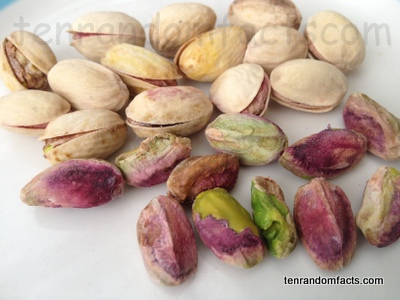Pistachios do not need a nutcracker – the nut cracking is already done for you!
- Pistachios are an edible, ovoid nut, encased in a shell, and are native to some Middle Eastern countries, as well as some neighbouring countries in Asia and Europe, and they have been cultivated for thousands of years.
- The pistachio plant that the nuts grow on, is generally a small tree with the scientific name Pistacia vera, from the family Anacardiaceae, the family of cashews, which also includes mangoes and pink peppercorns; and once ripe, the nuts are shaken from the tree as part of the harvesting process.
- A single pistachio tree can reach up to 10 metres (33 feet) in height, and can produce approximately 50 kilograms (110 pounds) of nuts over a period of two years, and one year is generally a high yield year, while the other year produces a lower quantity of nuts.
- Pistachio nuts are small, generally ranging from 1.5 to 2.2 centimetres (0.6 to 0.87 inches) and weighing roughly 1 to 2 grams (0.03 to 0.07 ounces), with the shell intact.
- When ripe, the hard shell of pistachios will commonly crack and split halfway while still inside the hull, which is removed after harvesting, allowing access to the edible kernel without the use of a nut cracker.
- The shells of pistachios are naturally coloured a pale sandy brown, however they may be artificially coloured green or red, a tradition first begun when hand pickers were used, to disguise any handling damage; while the kernel and its skin is usually a green to purple colour.
- Generally, pistachios are eaten raw or roasted, often as a snack; are occasionally added to desserts or used in baked goods, or added to icecream or chocolate; and they are commonly purchased already salted.
- Iran, in the Middle East, was the greatest producer of pistachios in 2013, producing more than half of the world’s annual quantity, with 478,600 tonnes (527,566 tons), while it is said that China is the greatest consumer at 80,000 tonnes (88,185 tons) annually.
- Along with causing reactions in those people who are allergic to tree nuts, pistachios are susceptible to a mould that can be dangerous to human health, if not harvested quickly and correctly.
- Pistachios are very high in vitamin B6, thiamine, copper, manganese, phosphorus, protein, fibre and fat, and they contain many other vitamins and minerals.
Bibliography:
Pistachio, 2015, Wikipedia, https://en.wikipedia.org/wiki/Pistachio
Pistachio Nuts Benefits, Side Effects, Nutrition Value and Facts, n.d, Seed Guides, http://www.seedguides.info/pistachios/
Some Physical and Mechanical Properties of Pistachio Nut, 2007, National Centre for Agrarian Sciences, http://www.agrojournal.org/13/02-12-07.pdf







